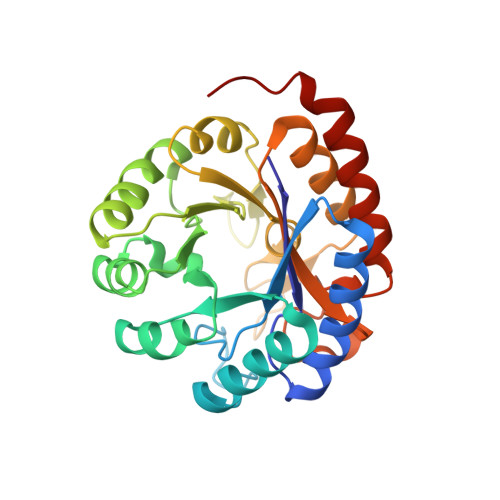Electronic structure of the metal center in the Cd(2+), Zn(2+), and Cu(2+) substituted forms of KDO8P synthase: implications for catalysis.
Kona, F., Tao, P., Martin, P., Xu, X., Gatti, D.L.(2009) Biochemistry 48: 3610-3630
- PubMed: 19228070
- DOI: https://doi.org/10.1021/bi801955h
- Primary Citation of Related Structures:
1FWS, 1FWW, 2A21, 2A2I, 3E0I, 3E12 - PubMed Abstract:
Aquifex aeolicus 3-deoxy-d-manno-octulosonate 8-phosphate synthase (KDO8PS) is active with a variety of different divalent metal ions bound in the active site. The Cd(2+), Zn(2+), and Cu(2+) substituted enzymes display similar values of k(cat) and similar dependence of K(m)(PEP) and K(m)(A5P) on both substrate and product concentrations. However, the flux-control coefficients for some of the catalytically relevant reaction steps are different in the presence of Zn(2+) or Cu(2+), suggesting that the type of metal bound in the active site affects the behavior of the enzyme in vivo. The type of metal also affects the rate of product release in the crystal environment. For example, the crystal structure of the Cu(2+) enzyme incubated with phosphoenolpyruvate (PEP) and arabinose 5-phosphate (A5P) shows the formed product, 3-deoxy-d-manno-octulosonate 8-phosphate (KDO8P), still bound in the active site in its linear conformation. This observation completes our structural studies of the condensation reaction, which altogether have provided high-resolution structures for the reactants, the intermediate, and the product bound forms of KDO8PS. The crystal structures of the Cd(2+), Zn(2+), and Cu(2+) substituted enzymes show four residues (Cys-11, His-185, Glu-222, and Asp-233) and a water molecule as possible metal ligands. Combined quantum mechanics/molecular mechanics (QM/MM) geometry optimizations reveal that the metal centers have a delocalized electronic structure, and that their true geometry is square pyramidal for Cd(2+) and Zn(2+) and distorted octahedral or distorted tetrahedral for Cu(2+). These geometries are different from those obtained by QM optimization in the gas phase (tetrahedral for Cd(2+) and Zn(2+), distorted tetrahedral for Cu(2+)) and may represent conformations of the metal center that minimize the reorganization energy between the substrate-bound and product-bound states. The QM/MM calculations also show that when only PEP is bound to the enzyme the electronic structure of the metal center is optimized to prevent a wasteful reaction of PEP with water.
Organizational Affiliation:
Department of Biochemistry and Molecular Biology, Wayne State University School of Medicine, Detroit, Michigan 48201, USA.

















